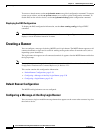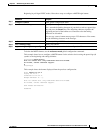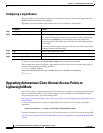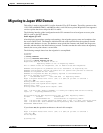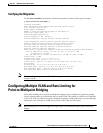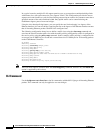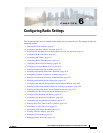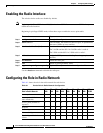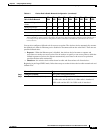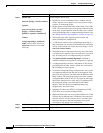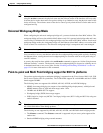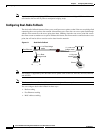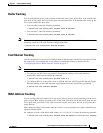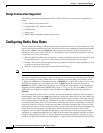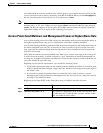
6-2
Cisco IOS Software Configuration Guide for Cisco Aironet Access Points
OL-29225-01
Chapter 6 Configuring Radio Settings
Enabling the Radio Interface
Enabling the Radio Interface
The wireless device radios are disabled by default.
Note Beginning with Cisco IOS Release 12.3(8)JA there is no SSID. You must create an SSID before you can
enable the radio interface.
Beginning in privileged EXEC mode, follow these steps to enable the access point radio:
Use the shutdown command to disable the radio port.
Configuring the Role in Radio Network
Table 6-1 shows the role in the radio network for each device.
Command Purpose
Step 1
configure terminal Enter global configuration mode.
Step 2
dot11 ssid ssid Enter the SSID. The SSID can consist of up to 32 alphanumeric
characters. SSIDs are case sensitive.
Step 3
interface dot11radio {0 | 1} Enter interface configuration mode for the radio interface.
The 2.4-GHz and the 802.11n 2.4-GHz radio is radio 0
The 5-GHz and the 802.11n 5-GHz radio is radio 1.
Step 4
ssid ssid Assign the SSID you created in Step 2 to the appropriate radio
interface.
Step 5
no shutdown Enable the radio port.
Step 6
end Return to privileged EXEC mode.
Step 7
copy running-config startup-config (Optional) Save your entries in the configuration file.
Table 6-1 Device Role in Radio Network Configuration
Role in Radio Network
AP
1040
AP
1100
AP
1130
AP
1140
AP
1200
AP
1240
AP
1250
AP
1260
1300
AP/BR
Access point X XX X XXXXX
Access point (fallback to
radio shutdown)
XXXXXXXXX
Access point (fallback to
repeater)
XXXXXXXXX
Repeater X X X X X X X X X
Root bridge X – – X X X X X X
Non-root bridge X – – X X X X X X
Root bridge with wireless
clients
X–– XXXXXX



